In today’s world, running a business is not just about working hard; it’s about working smart. This is where AI tools for business come in. These tools are designed to help businesses do things faster, make better decisions, and stay ahead of their competition.
Imagine having a tool that can handle routine tasks, analyze data, or even predict what your customers need—this is exactly what AI can do for your business. No matter if you own a small shop or manage a big company, the right AI tools can save you time, improve your work, and even help you grow faster.
In this blog, we’ll talk about the 10 best AI tools for business in 2025. These tools are trusted by businesses around the world to simplify their work and achieve better results. Let’s explore how these smart tools can take your business to the next level!
Why AI Tools Are Essential for Businesses
In today’s fast-paced business world, AI tools for business have become essential for companies aiming to stay competitive and efficient. These tools help automate tasks, provide valuable insights, and enhance decision-making processes.
Automating Repetitive Tasks
AI tools can handle routine tasks, freeing up employees to focus on more strategic activities. For instance, AI-powered chatbots manage customer inquiries, allowing support teams to address complex issues. A recent survey found that 56% of businesses use AI to improve operations, highlighting its role in enhancing efficiency.
Enhancing Decision-Making
AI tools analyze large datasets to uncover patterns and trends, helping businesses in making informed decisions. This capability is crucial for understanding customer behavior, optimizing marketing strategies, and forecasting sales. Notably, 92.1% of businesses reported measurable results from AI investments, indicating improved decision-making and performance.
Gaining a Competitive Edge
Adopting AI tools enables businesses to innovate and adapt swiftly to market changes. Companies that embrace AI are better positioned to offer personalized customer experiences and streamline operations. In fact, 35% of businesses have already adopted AI, with an additional 42% considering its implementation, underscoring the growing recognition of AI’s strategic importance.
In summary, integrating AI tools for business is no longer optional but a necessity for achieving efficiency, informed decision-making, and maintaining a competitive advantage in the modern marketplace.
Top 10 AI Tools for Business in 2025
In 2025, businesses are relying more on AI tools to stay efficient and competitive. From automating workflows to making data-driven decisions, these tools are helping businesses of all sizes. Here are the 10 best AI tools for business that can take your company to the next level:
1. ChatGPT
ChatGPT, developed by OpenAI is one of the most versatile AI tools for business. It is an AI language model designed to generate human-like text, assisting with tasks such as drafting emails, writing code, and answering questions.
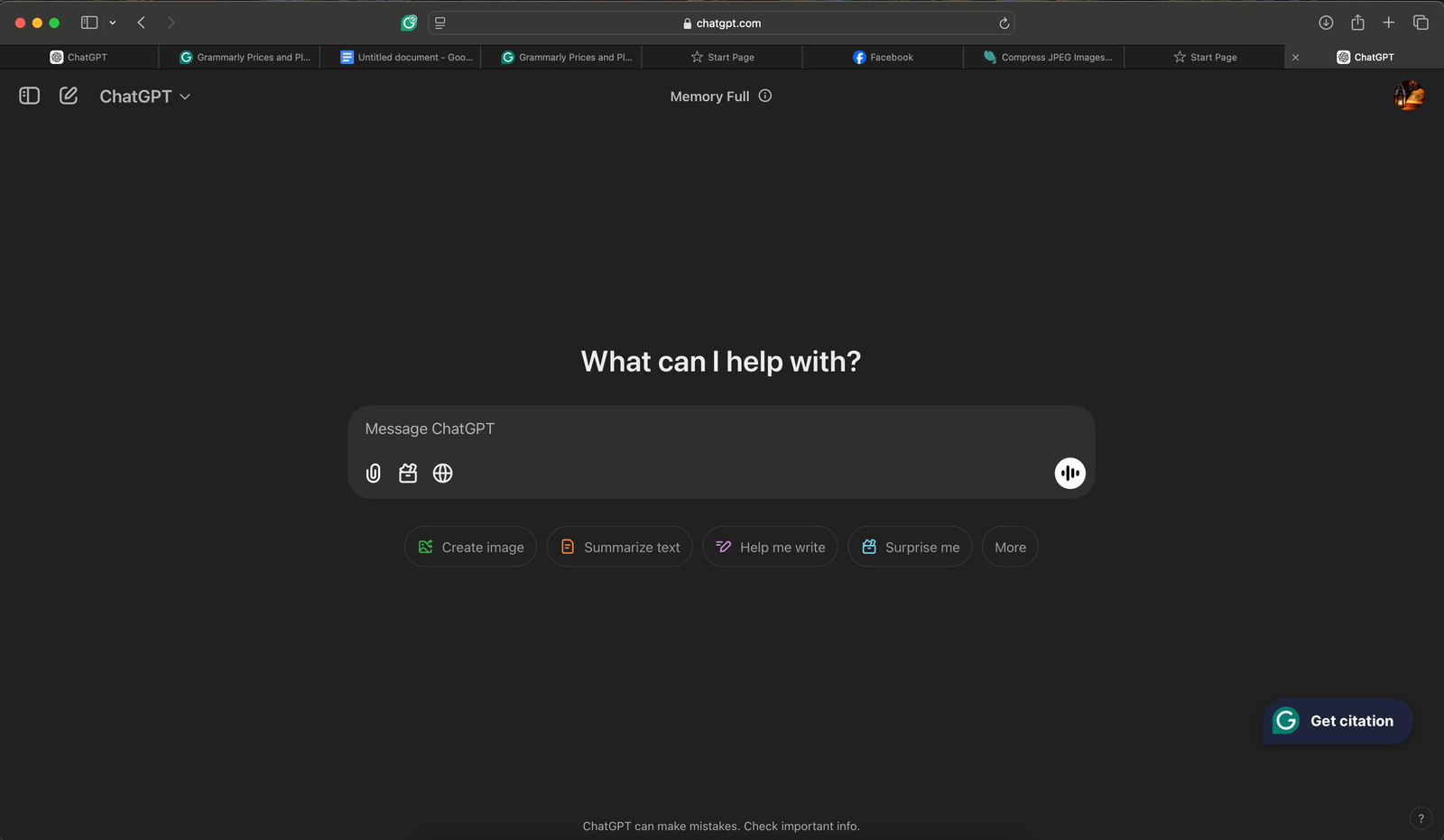
Key Features:
- Natural language understanding and generation.
- Contextual conversation capabilities.
- Integration via API for custom applications.
Pricing:
- Free Tier: Access to GPT-3.5.
- ChatGPT Plus: $20 per month, providing general access at peak times, faster response times, and special access to new features and improvements.
- ChatGPT Pro: $200 per month, includes unlimited access to the latest models, such as o1, GPT-4o, and advanced voice functionalities.
Who It’s Best For:
- Individuals and businesses seeking advanced AI capabilities for content generation, coding assistance, and conversational agents.
Pros:
✓ Versatile across various applications.
✓ Regular updates with new features.
✓ Scalable solutions for different user needs.
Cons:
✗ Higher tiers may be costly for some users.
✗ May require fine-tuning for specific industry applications.
Visit ChatGPT website
2. Grammarly
Grammarly is an AI-powered writing assistant and it helps users improve their writing by suggesting grammar, spelling, punctuation, and style.
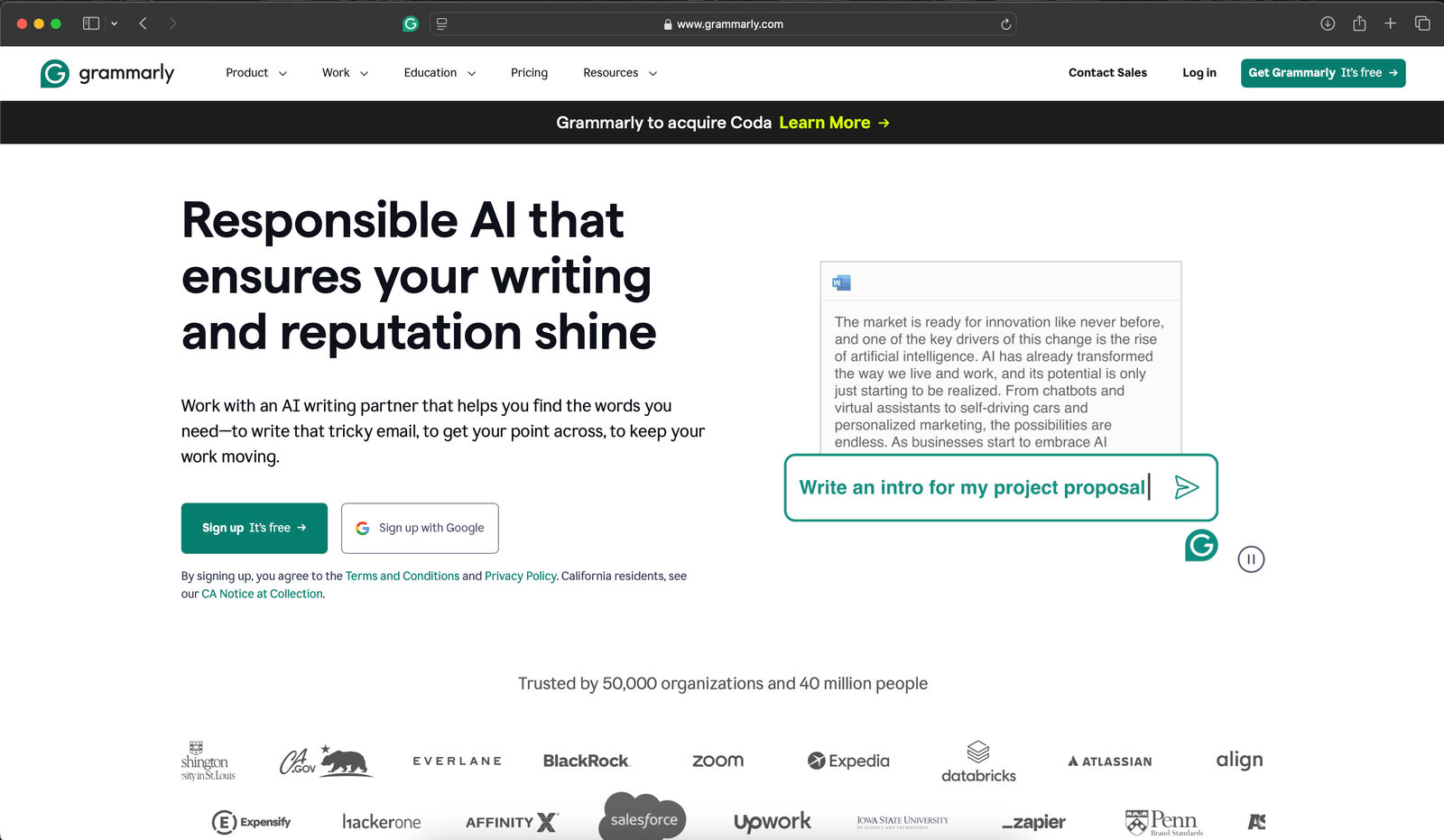
Key Features:
- Real-time grammar and spell checking.
- Tone and style adjustments.
- Plagiarism detection.
- Integration with various platforms and browsers.
Pricing:
- Free Plan: Basic writing suggestions.
- Premium: Affordable among AI tools for business Starting at $12 per month, offering advanced suggestions and style improvements.
- Business: You need to contact the sales team to know prices that fit your team or organization.
Who It’s Best For:
- Students, professionals, and businesses aim to improve the clarity and effectiveness of their written communication.
Pros:
✓ User-friendly interface.
✓ Comprehensive writing feedback.
✓ Integrates seamlessly with multiple platforms.
Cons:
✗ Premium features require a subscription.
✗ May not catch all context-specific errors.
Visit Grammarly website
3. Jasper AI
Jasper AI is a content generation powerhouse, making it one of the most sought-after AI tools for business marketing. It helps teams create engaging, SEO-friendly content at scale.
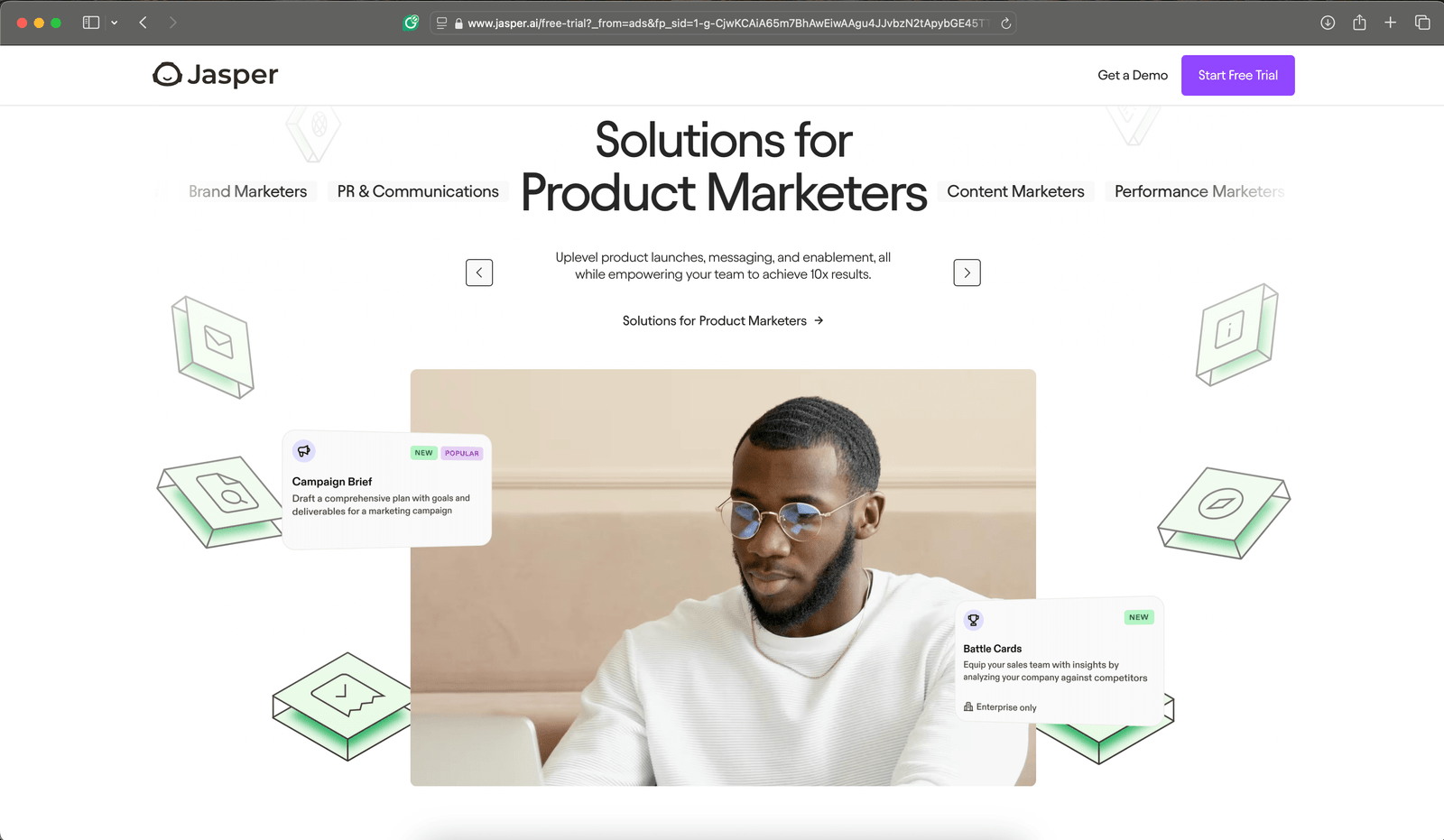
Key Features:
- Pre-built templates for various content types.
- SEO optimization suggestions.
- Multi-language support.
- Integration with tools like Surfer SEO and Grammarly.
Pricing:
- Creator Plan: Begins at $39 per month.
- Pro Plan: Starts at $59 per month offering advanced features.
- Business plan: You need to contact the sales team.
Who It’s Best For:
- Content creators, marketers, and businesses seeking to streamline content production with AI assistance.
Pros:
✓ High-quality content generation.
✓ Time-saving with pre-built templates.
✓ Supports multiple languages fatforms.
Cons:
✗ Pricing may be high for small businesses.
✗ Requires human oversight to ensure content accuracy.
Visit Jasper AI website
4. ClickUp
ClickUp is a comprehensive project management platform enhanced with AI capabilities, making it a top choice for AI tools for business workflow optimization.
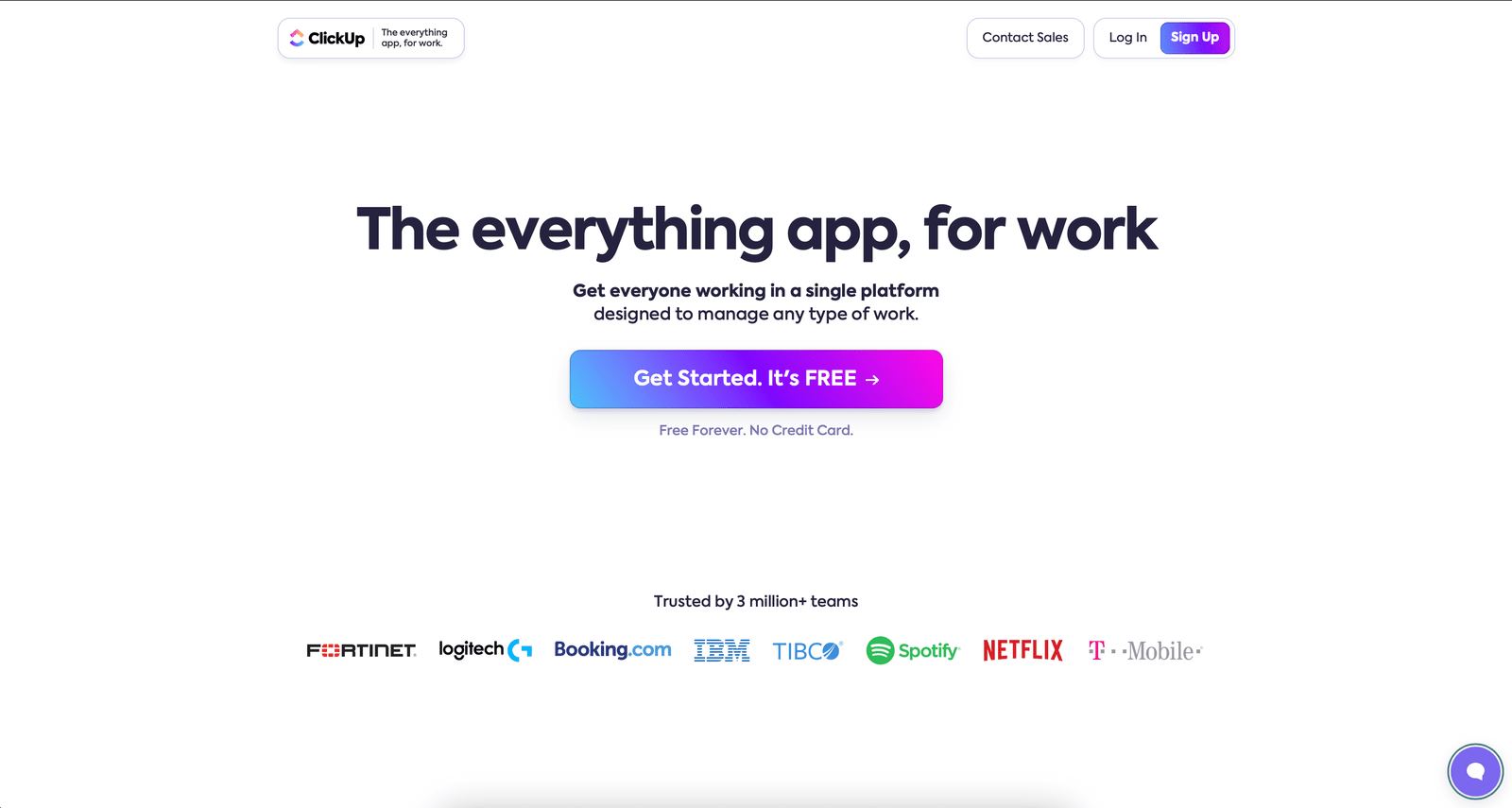
Key Features:
- Task management with customizable statuses.
- Time tracking and goal setting.
- Document creation and collaboration.
- Integrations with various third-party applications.
Pricing:
- Free Forever Plan: Includes unlimited tasks and members.
- Unlimited Plan: $7 per user per month, offering additional features like unlimited integrations and dashboards.
- Business Plan: $12 per user per month, includes advanced features suitable for mid-sized teams.
Who It’s Best For:
- Teams and organizations seeking a flexible and scalable project management solution.
Pros:
✓ Highly customizable to fit various workflows.
✓ Affordable pricing tiers.
✓ All-in-one platform for project management needs.
Cons:
✗ Can be overwhelming because of its extensive features.
✗ Learning curve for new users. accuracy.
Visit ClickUp website
5. DALL·E
DALL·E, from OpenAI, is a creative visual generator that ranks among the best AI tools for business marketing and design teams.
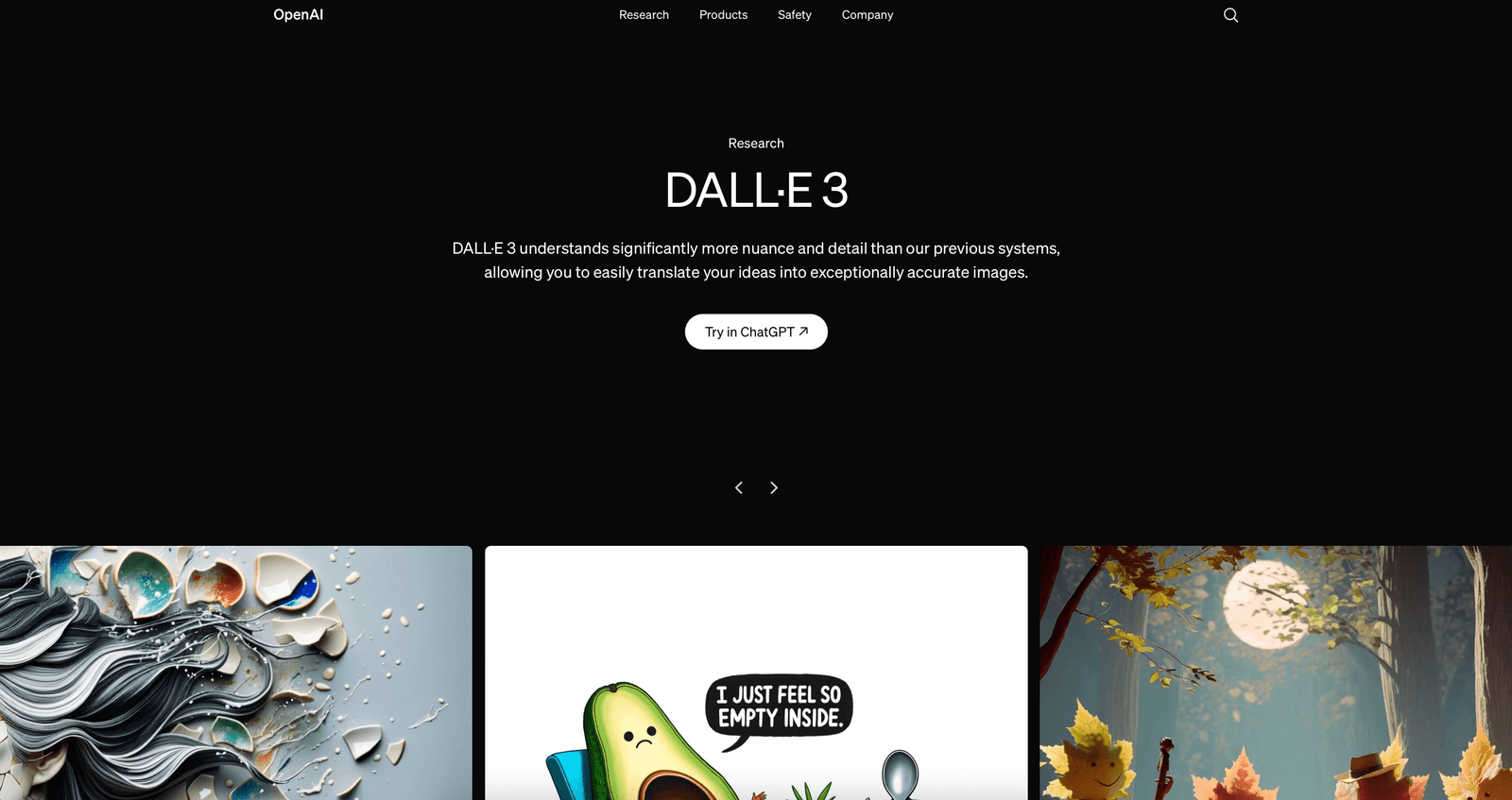
Key Features:
- Image Creation: Generates visuals based on descriptive text.
- Out painting: Expands existing images seamlessly.
- High-Resolution Outputs: Produces professional-quality visuals.
Pricing:
- Credits-Based System: Users buy credits to generate images, with pricing depending on usage.
Who It’s Best For:
- Creative professionals, marketing teams, and businesses needing high-quality custom visuals.
Pros:
✓ Saves time on graphic design.
✓ Easy to use without requiring design skills.
✓ Produces unique, high-quality results.
Cons:
✗ Limited editing capabilities compared to full design tools.
✗ Credits can run out quickly for high-volume users.
Visit DALL·E website
6. Asana AI
Asana AI is an enhanced version of the popular project management platform Asana, making it one of the most efficient AI tools for business project management. It streamlines workflows, predicts risks, and prioritizes tasks to ensure deadlines are met.
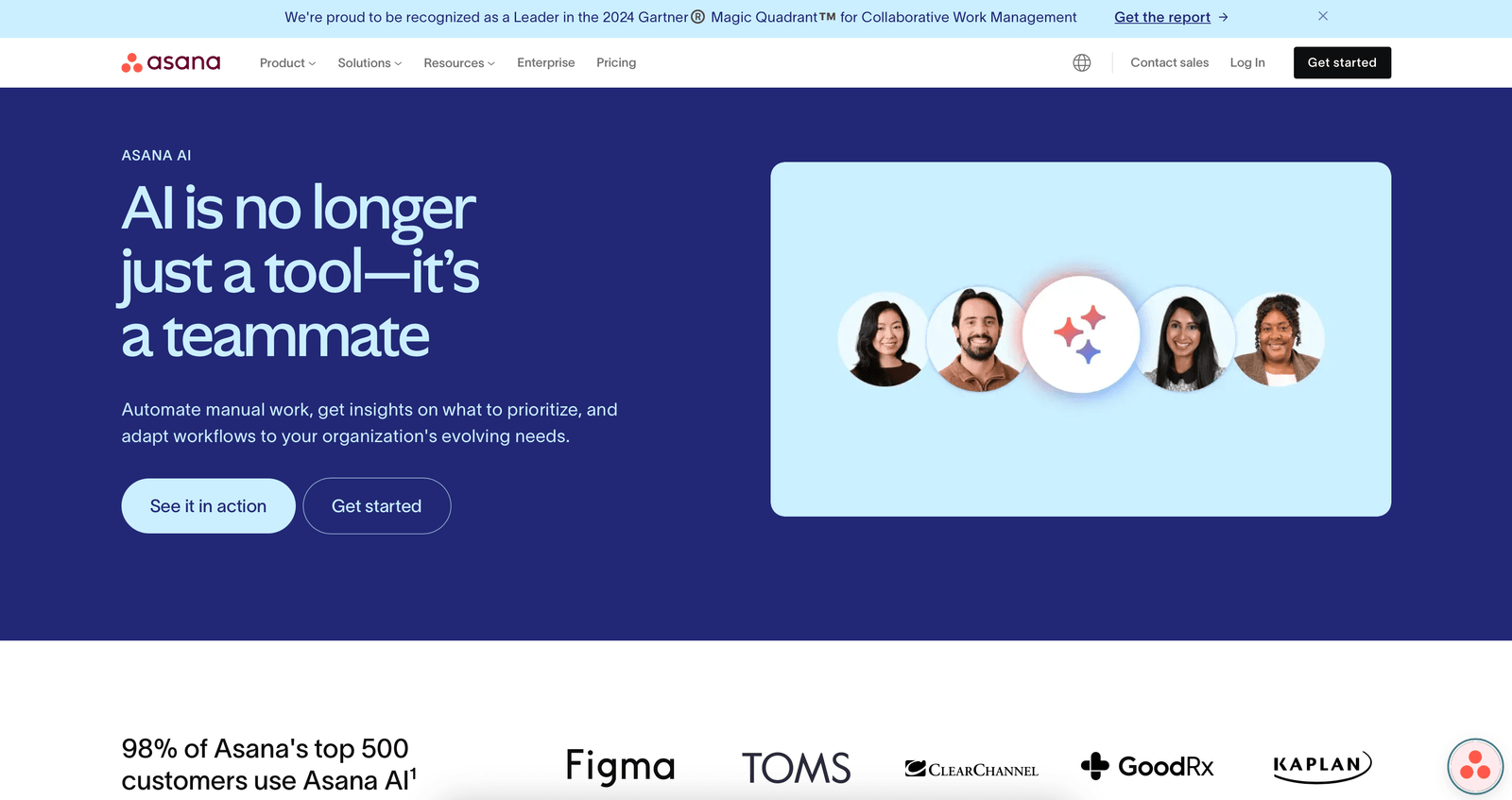
Key Features:
- Workflow Automation: Automates repetitive tasks and reminders.
- Predictive Analytics: Anticipates potential project risks.
- Smart Task Allocation: Suggests the best team member for specific tasks.
Pricing:
- Free Plan: Basic task management features.
- Premium Plan: $10.99/user/month for advanced capabilities.
- Business Plan: $24.99/user/month for enterprise-grade features.
Who It’s Best For:
- Medium to large teams managing complex projects and workflows.
Pros:
✓ Improves efficiency with smart task suggestions.
✓ Great for tracking progress across multiple teams.
✓ Integrates seamlessly with tools like Slack and Google Workspace.
Cons:
✗ Premium features are locked behind higher-tier plans.
✗ Can feel overwhelming for small teams or new users.
Visit Asana AI website
7. StoryChief
StoryChief is complete a content marketing platform that distinguishes itself from other AI tools for business by its capacity to manage, optimise, and distribute content across numerous channels.
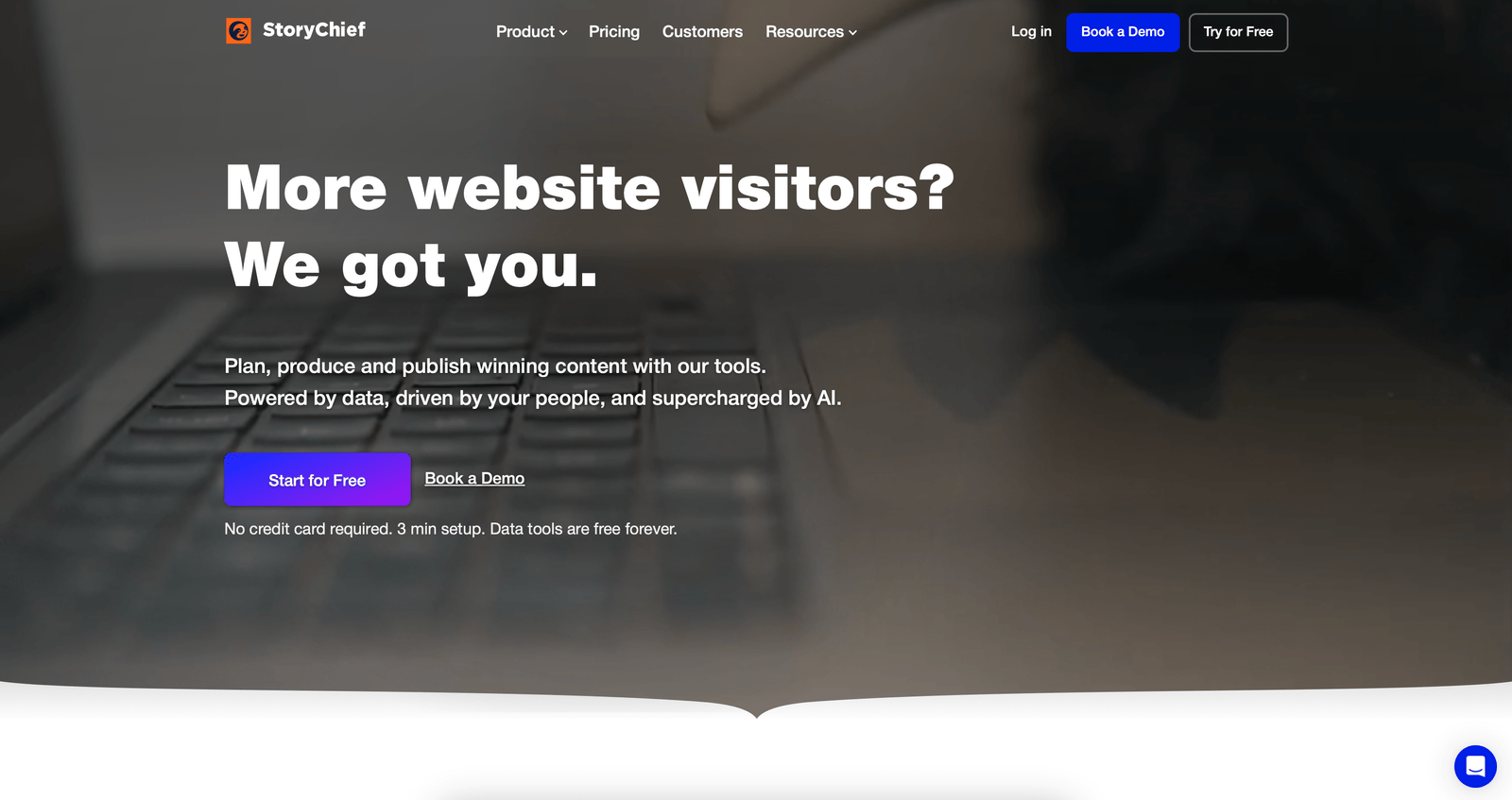
Key Features:
- Multi-Channel Publishing: Publish to blogs, social media, and newsletters simultaneously.
- SEO Optimization: AI-driven tools to improve content visibility.
- Performance Analytics: Track engagement and impact across platforms.
Pricing:
- Different types of pricing plans available.
Who It’s Best For:
- Content marketers, agencies, and businesses aiming to build and optimize their online presence.
Pros:
✓ Simplifies multi-platform publishing.
✓ Built-in SEO optimization features.
✓ Great for collaboration within content teams.
Cons:
✗ Expensive for smaller businesses or individuals.
✗ Limited customization for niche campaigns.
Visit StoryChief website
8. Notion AI
Notion AI is a powerful product added to the Notion productivity suite, making it a versatile option in the category of AI tools for business. It enhances note-taking, task management, and content creation through AI-driven features.
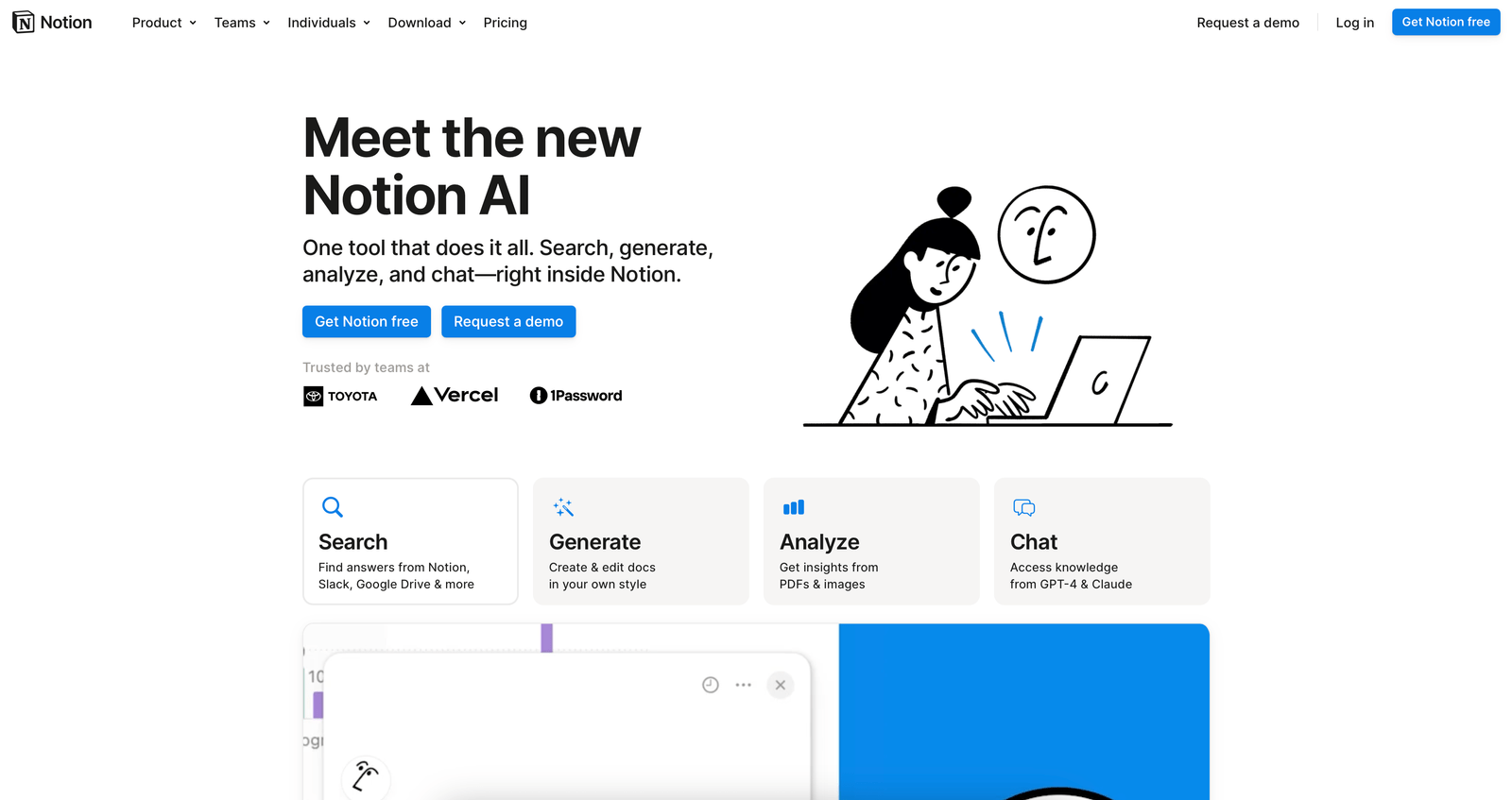
Key Features:
- Content Creation: Generate blog posts, summaries, and ideas with AI.
- Task Management Automation: Automatically organize tasks and set priorities.
- Document Summarization: Summarize lengthy documents or notes.
- Smart Suggestions: Offers actionable insights to improve productivity.
Pricing:
- Free Plan: with limited features
- Plus Plan: $10/user/month for access to Notion AI features.
- Business Plan: $15/user/month with advanced collaboration tools and AI.
Who It’s Best For:
- Teams and individuals seeking a productivity tool with AI-powered capabilities for content creation and task organization.
Pros:
✓ Seamlessly integrates with existing Notion workflows.
✓ AI is embedded directly into the workspace for quick access.
✓ Versatile for both personal and team use.
Cons:
✗ Limited to the Notion ecosystem.
✗ AI features require a paid plan for full access.
Visit Notion AI website
9. Speechify
Speechify is an AI-powered text-to-speech converter tool that transforms textual content into high-quality audio, making content more accessible for users on the go or with accessibility needs.
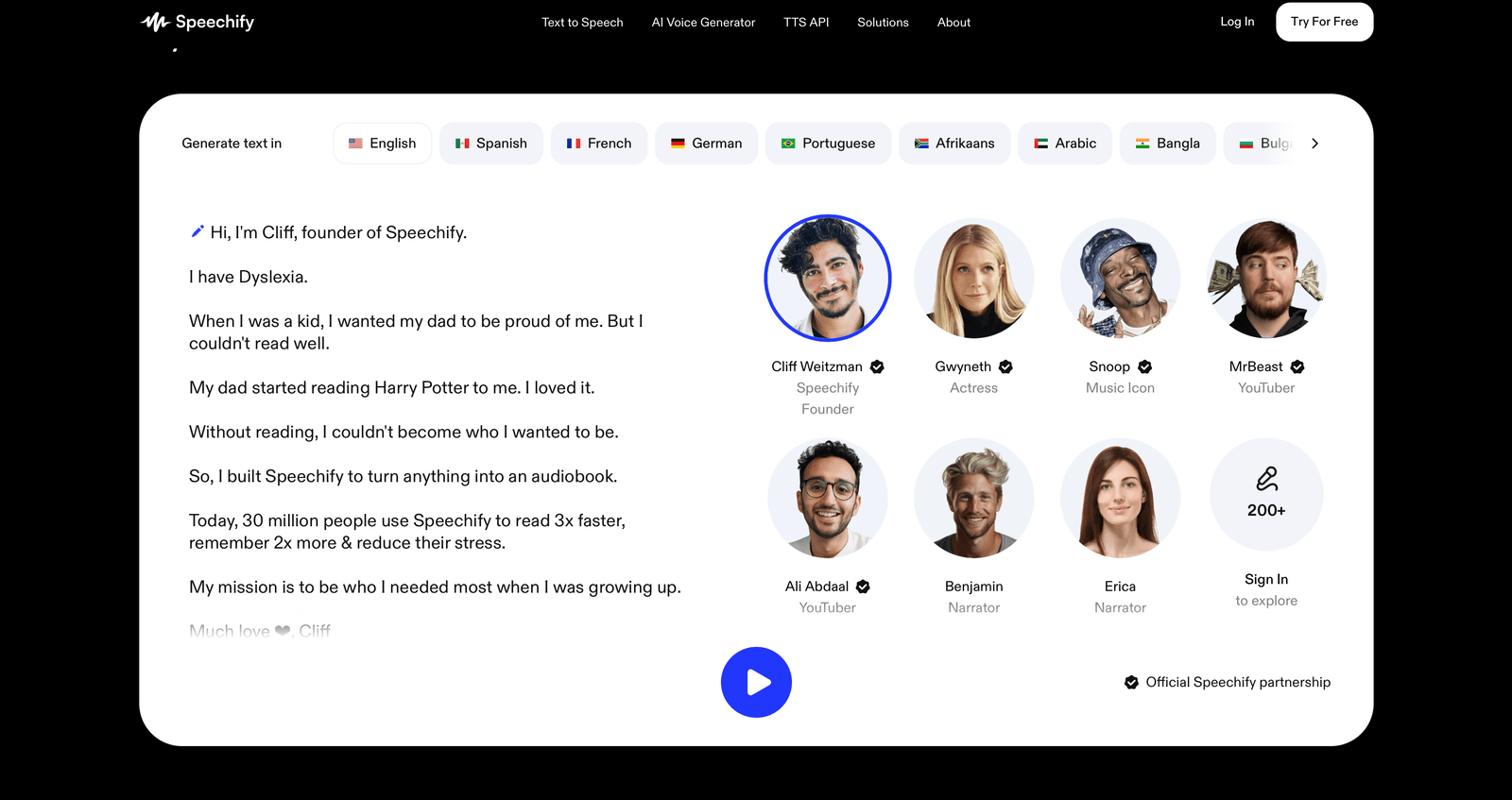
Key Features:
- Natural-Sounding Voices: Converts text into lifelike speech.
- Multi-Language Support: Supports numerous languages and accents.
- Adjustable Playback Speed: Lets users listen at their own pace.
Pricing:
- Free plan available; premium starts at $11.58/month (billed annually).
Who It’s Best For:
- Businesses and individuals aim to make their content more accessible or multitask while consuming information.
Pros:
✓ Enhances accessibility for content.
✓ Easy to use with adjustable settings.
✓ Great for multitasking professionals.
Cons:
✗ Limited features in the free version.
✗ Premium pricing can add up for larger teams.
Visit Speechify website
10. Perplexity AI
Perplexity AI is an advanced research assistant, earning its place among the top AI tools for business by delivering concise and accurate answers with verified citations.
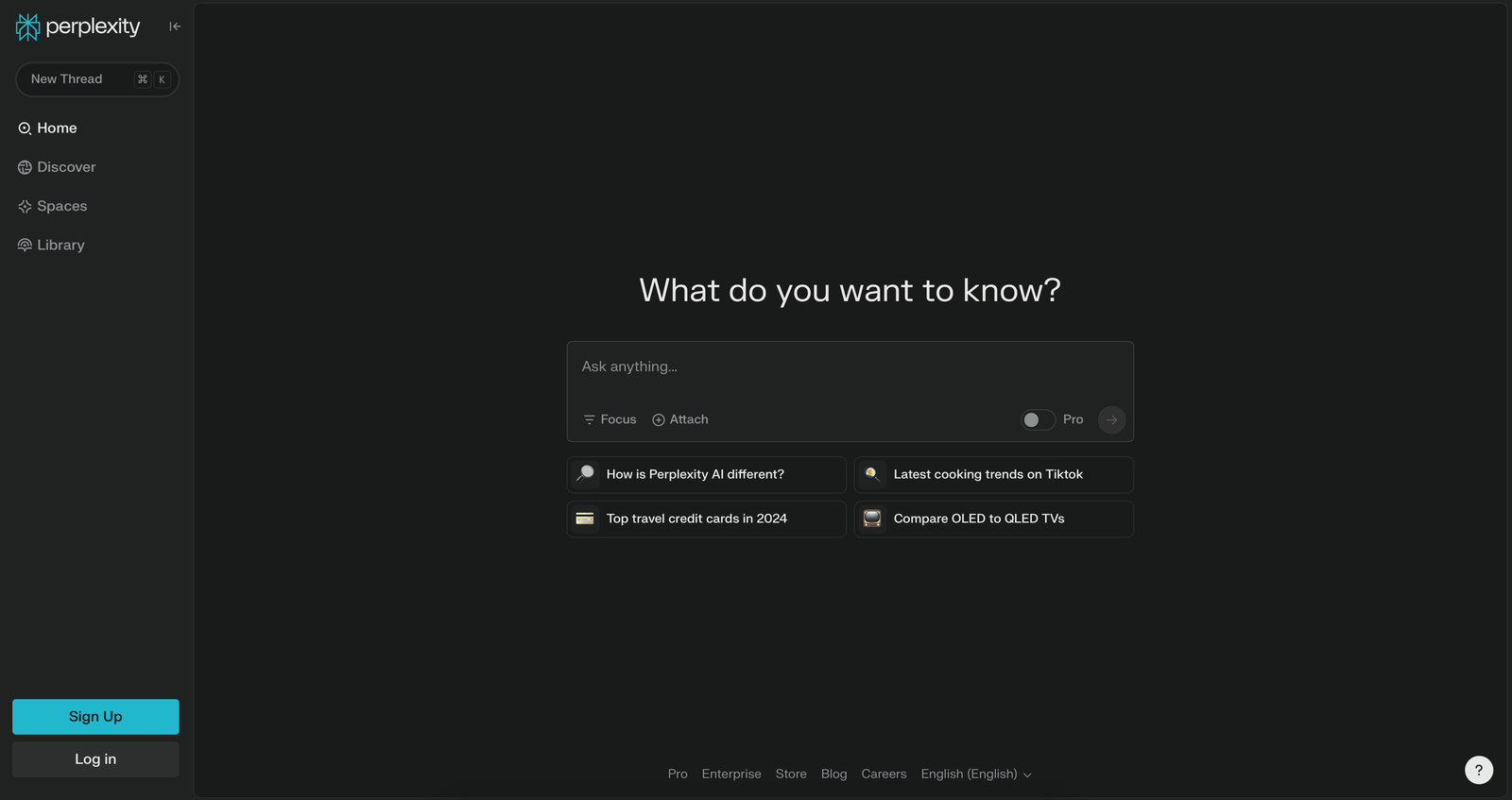
Key Features:
- AI-Powered Q&A: Delivers precise answers with explanations.
- Document Summarization: Condenses lengthy articles and reports into digestible summaries.
- Citations for Reliability: Links to verified sources for every answer.
Pricing:
- Free plan available; premium features under development.
Who It’s Best For:
- Research-heavy industries like consulting, law, and academia.
Pros:
✓ Provides fast, reliable answers.
✓ Great for summarizing complex information.
✓ Free for core functionality.
Cons:
✗ Limited customization options.
✗ Still evolving, with premium features yet to launch.
Visit Perflexity AI website
How to Choose the Right AI Tools for Business
Choosing the best AI tools for business might be difficult because there are a lot of options. The key to success is to match the tool’s functionality to your company’s requirements. Here are some factors to consider when choosing the right AI tools for business:
1. Define Your Business Goals
Before diving into the world of AI tools for business, identify the specific tasks or problems you aim to solve.
- Are you looking to automate customer service?
- Do you need better data insights for decision-making?
- Are you trying to improve team communication or workflow efficiency?
Understanding your goals will help you focus on tools that address your most pressing needs.
2. Evaluate Your Budget
AI tools come in a range of pricing plans. Compare the costs of different AI tools for business to ensure they align with your budget.
- Free tools like Zapier’s basic plan are great for startups or small-scale tasks.
- Higher-priced solutions like Salesforce Einstein offer enterprise-grade features but may not suit smaller businesses.
Make sure the tool’s cost aligns with its value for your business.
3. Check Integration Capabilities
The best AI tools for business integrate seamlessly with your existing systems and software. For example:
- Tools like Zapier specialize in connecting multiple platforms, making integration hassle-free.
- Tableau and Salesforce Einstein offer extensive integration options but may require technical setup.
4. Prioritize Ease of Use
When selecting AI tools for business, ensure they are easy to use for your team.
- Tools like Grammarly Business and Zapier are known for their user-friendly design.
- More complex tools like Tableau may need training for advanced features.
5. Assess Scalability
Your business needs will grow over time, so choose AI tools for business that can scale with you.
- Tools like Salesforce Einstein and Tableau are designed to scale with larger teams and higher data volumes.
- For smaller businesses, ChatGPT or Grammarly Business might be a better fit initially.
6. Look for Customer Support
Reliable support is crucial when implementing AI tools for business. Look for tools that offer.
- Check whether the tool offers live chat, email, or phone support.
- Look at reviews or case studies to see how responsive and helpful the support team is.
7. Test Before Committing
Most AI tools for business offer free trials or demos. Use these opportunities to test their capabilities and determine if they align with your needs.
8. Read Reviews and Compare Features
Finally, read reviews and case studies of different AI tools for business. Look for real-world examples to understand how these tools perform in similar industries.
Final Tip
Choose AI tools that meet your company’s current needs but can also adapt to future difficulties. Whether it’s improving productivity, gaining insights, or automating workflows, the right tool will help your business stay ahead in 2025 and beyond.
Conclusion
In 2025, businesses that embrace AI tools will gain a significant edge over their competitors. These tools aren’t just about automating tasks—they’re about transforming how companies operate, make decisions, and deliver value to their customers. Whether you’re a small business owner or part of a large enterprise, there’s an AI tool for business that can meet your needs.
Choosing the right tool comes down to understanding your goals, budget, and team requirements. By investing in the right AI solutions, you’re not just keeping up with the times—you’re positioning your business for long-term success.
So why wait? Start exploring these tools today and see how they can help you work smarter, save time, and grow faster!
If scheduling and appointment management are also on your priority list, don’t miss our detailed review of Tidycal, available at an unbeatable lifetime deal on Appsumo.
FAQs (Frequently Asked Questions)
Here are some common questions about AI tools for business to help you understand their importance and application:
What are AI tools for business?
AI tools for business are software solutions powered by artificial intelligence that help automate tasks, analyze data, and improve decision-making. These products are designed to increase productivity, cut expenses, and improve customer experience.
How do AI tools benefit small businesses?
AI tools are incredibly beneficial for small businesses as they:
- Automate repetitive tasks like scheduling and email responses.
- Offer useful insights on consumer behaviour and market trends.
- Help save time and resources by streamlining workflows.
For example, tools like ChatGPT can automate customer support, and Grammarly Business ensures professional communication.
Are AI tools expensive?
Not all AI tools are expensive. Many tools offer free or affordable plans tailored to small businesses. For example:
- Zapier offers a free plan for basic automation.
- Grammarly Business costs $15/user/month, making it accessible for smaller teams.
- However, advanced solutions like Tableau or Salesforce Einstein may require a higher budget.
Are technical skills required to use AI tools?
Most AI tools have user-friendly interfaces and need little or no technical skills.
- Tools like Grammarly and Zapier are intuitive and easy to use.
- More complex tools like Tableau may require training for advanced features, but basic functions are manageable for most users.
How do I know if an AI tool is right for my business?
To determine if an AI tool is suitable for your business:
- Define your goals (e.g., automation, data analysis, customer service).
- Consider your budget and integration needs.
- Test the tool using demos or reviews to ensure it fits your requirements.
Can AI tools replace employees?
Artificial intelligence tools are not intended to replace employees, but rather to support them. They handle repetitive or time-consuming duties, allowing staff to concentrate on more valuable activities including as strategy, innovation, and client interactions.
Which industries benefit the most from AI tools?
AI tools are versatile and benefit industries such as:
- Retail: For personalized marketing and inventory management.
- Healthcare: For patient data analysis and diagnostics.
- Finance: For fraud detection and automated customer support.
- Logistics: Used to optimise routes and manage the supply chain.
References:
